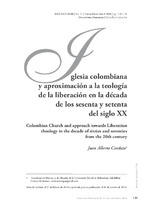| dc.contributor.author | Cardozo, Juan Alberto | |
| dc.coverage.spatial | Seccional Medellín | spa |
| dc.date.accessioned | 2021-02-08T21:26:57Z | |
| dc.date.available | 2021-02-08T21:26:57Z | |
| dc.date.issued | 2014 | |
| dc.identifier.uri | http://hdl.handle.net/20.500.11912/7998 | |
| dc.description | p. 139 - 158 | spa |
| dc.description.abstract | La teología de la liberación se convierte en un paradigma de interpretación de la praxis eclesial al final del milenio, marcando una ruptura a las formas centenarias de acción y devenir de la Iglesia en el continente Americano. La Iglesia en Colombia en este contexto también se acerca a esta forma de hacer teología que es novedosa a nivel histórico en todo el planeta y tanto sacerdotes como algunos obispos del país se adhieren a ella. Esto no estuvo exento de polémicas y persecuciones de parte de aquellos que veían en ella un peligro al dogma católico y al poder que la Iglesia tenía en el país desde años atrás. Se presenta entonces una relación cronológica de los postulados de esta tendencia teológica y su aplicación y relación a la Iglesia y a la sociedad del país entre los años 1965 y 1979. | spa |
| dc.description.abstract | The liberation theology becomes a paradigm for the interpretation of ecclesial practice at the end of the millennium marking a break with the century-old forms of action and future of the Church in the Americas. The Church in Colombia in this context is also close to this way of doing theology that is novel to historical levels around the planet and both priests and bishops of the country stick to it. This was not without controversy and persecution from those who saw it, Liberation Theology, a danger to the Catholic dogma and the power that the Church was in the country for years. We can see thus a chronological account of the tenets of this theological trend and their application and relationship to the Church and society of the country between 1965 and 1979. | spa |
| dc.format.mimetype | application/pdf | |
| dc.language.iso | spa | |
| dc.publisher | Universidad Pontificia Bolivariana | spa |
| dc.relation.ispartof | Pensamiento humanista | spa |
| dc.rights | Attribution-NonCommercial-NoDerivatives 4.0 International | * |
| dc.rights.uri | http://creativecommons.org/licenses/by-nc-nd/4.0/ | * |
| dc.subject | Teología de la liberación | spa |
| dc.subject | Iglesia colombiana | spa |
| dc.subject | Marxismo | spa |
| dc.subject | Guerrillas | spa |
| dc.subject | Theology Liberation | spa |
| dc.subject | Colombian Church | spa |
| dc.subject | Marxism | spa |
| dc.subject | Guerrillas | spa |
| dc.title | Iglesia colombiana y aproximación a la teología de la liberación en la década de los sesenta y setenta del siglo XX | spa |
| dc.title.alternative | Colombian Church and approach towards Liberation theology in the decade of sixties and seventies from the 20th century | spa |
| dc.type | article | spa |
| dc.rights.accessRights | openAccess | spa |
| dc.type.hasVersion | publishedVersion | spa |
| dc.description.sectional | Medellín | spa |
| dc.identifier.instname | instname:Universidad Pontificia Bolivariana | spa |
| dc.identifier.reponame | reponame:Repositorio Institucional de la Universidad Pontificia Bolivariana | spa |
| dc.identifier.repourl | repourl:https://repository.unab.edu.co/ | |


